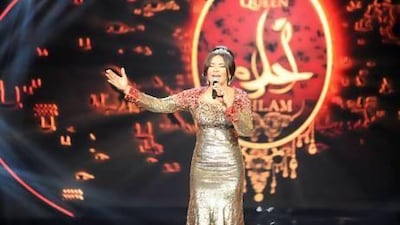A talent show sinks and swims with the calibre of its contestants.
But with Ahlam on the judging panel, MBC's Arab Idol has a nifty insurance policy for any dull moment that may arise.
The Emirati singer and all-out diva has more than once stolen the show from her fellow judges and contestants with controversial quotes, colourful outfits and a regal guest performance in the semi-final.
The result so far has this year's series follow two plot-lines: Who will make it to the final? And what will Ahlam say next?
Ahlam shrugs off all the online and tabloid chatter.
"This is how I am," she states. "Look, I am very spontaneous. What you see is what you get. The way that I speak to you now is the way I speak to my family at home. When it comes to celebrity, that came from my fans and not myself. I consider myself to be a very natural person."
Born Ahlam Ali Al Shamsi in the capital, the 44-year-old spent her early childhood in Bahrain before returning to the UAE to complete her high school and university education.
Her music career began when she was a child, with roles in school plays and performances in local concerts and events.
Spotted by the Kuwaiti composer Anwar Abdullah, Ahlam first signed to the label Funoon Al Emarat in 1995 before settling with the heavyweights Rotana Records in 2006. In that time span, she released 10 hit albums.
With a fan base spanning the Middle East and North Africa, Ahlam and her fellow Emirati pop star Hussein Al Jassimi are considered the leading purveyors of Gulf music, also known as Khaleeji pop, across the region.
In turn, Gulf composers and lyricists have become hot commodities, with artists from Amr Diab to Asala adding a Gulf song or two to their live repertoire.
The evocative lyrics are responsible for the popularity of Gulf music, Ahlam says.
"I believe the Gulf song is the master of the Arab music world," she says. "Many of the great Arab singers love Gulf songs. Examples are legends like Umm Kuthoum and Mohammed Abdul Wahab. They performed Gulf songs as well. I believe when an artist performs such music, they cannot help but be affected by it."
However, the genre's popularity comes with risks for aspiring performers.
Ahlam states that many well-intentioned artists fail miserably at performing Gulf music because of weak pronunciation.
"Sometimes you have singers performing such songs in Gulf accents with no command of it and the end result is it sounds like total nonsense," she says. "For example, you have to be particular when you are pronouncing your Rs. If you don't pay attention, you end up muddling the meaning."
Ahlam brings this mixture of honesty and attention to detail to the Arab Idol judging panel.
She explains that her determination to get the best out of every contestant is more important than any furore caused by her comments.
"I don't like contradictions," she says. "The comments that I give are meant to allow the performer to give it their best all the time. It is my responsibility to them."
Ahlam points to the Syrian finalist Farah Youssef as an example of her tough-love approach.
"There were times where I criticised her because she performed in a way that I didn't like. I told her that she should be more soft in her vocal performance and now people love her," Ahlam says.
"People thought I had certain preferences to other people and that is simply not the case. I think the finalists are partly there because of our vision as judges."
Ahlam is looking forward to the final performances.
Also known as a fashion icon, she hopes the contestants pay attention to their appearance as well as their voice.
"Image is important to preparation," she says. "It should be studied because that is also a sign of respect from the artist to the audience. The presentation is a very important addition to the performance."
Again, some could criticise such remarks, labelling them as superficial. Ahlam dismisses such thoughts.
She says she is preparing the finalists for the real world awaiting them once the cameras are off.
"It is our responsibility to criticise," she says. "Our role as judges is to provide good guidance. We want to orient them to what really happens in the music industry. That is our job."
Follow us
Follow us on Facebook for discussions, entertainment, reviews, wellness and news.


